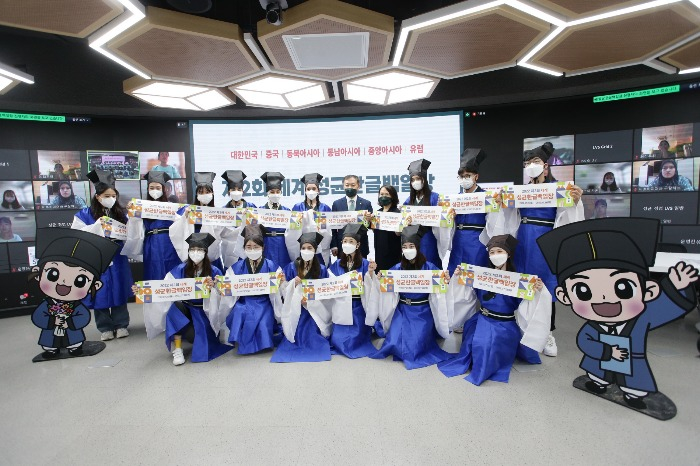Tech, Media & Telecom
S.Korea to ease internship visa rules for foreign talent ┬Ā
The visa program applies to foreign students majoring in high technology at leading universities
By Aug 05, 2022 (Gmt+09:00)
3
Min read
Most Read
Macquarie Korea Asset Management confirms two nominees


Deutsche Bank's Korea IB head quits after country head resigns


Hanwha buys SŌĆÖpore Dyna-MacŌĆÖs stake for $73.8 mn from Keppel


Korea's Taeyoung to sell local hotel to speed up debt workout


Meritz leaves door open for an M&A, to stay shareholder friendly



South Korea will introduce an internship visa program for foreigners studying at overseas universities to ease a shortage of talent in the fields of semiconductors and other high technology, the Ministry of Justice said on Friday.
Under the new rules set to come into force next week, foreign students at leading overseas universities will be allowed to work as interns at Korean IT companies or research institutes.
ŌĆ£Most students tend to land a job at the company where they finish an internship before graduation,ŌĆØ said an IT industry official.
"This new visa program will open the door wide to foreign talent.ŌĆØ
Until now, foreign nationals studying at overseas colleges have not been eligible for internships at Korean companies. In other words, internship visas for foreigners have been issued only to those with academic degrees, or foreign students at a local university.
The new visa program will allow foreign talent studying at foreign colleges to work for Korean high-tech companies listed on the local bourse, research institutes run by companies, startups or state-run science and technology research institutes.
But the program will be restricted to companies or research institutes related to semiconductors, nanoelectronics, biology, new materials, energy and other high technology.
The intern must be a student or someone who has graduated from one of Time magazine's list of top 200 universities in the last three years.┬Ā
Either that or, the candidate must be set to receive a degree in an area of advanced technology from one of Quacquarelli SymondsŌĆÖs (QS) list of top 500 universities in the world.

PAY GUARANTEES, HIGHER EDUCATION OPPORTUNITIES
To help foreign students land jobs at local companies after finishing their internships, South Korea will extend their one-time job search period from the current six months to one year.
Also, they will be paid the countryŌĆÖs minimum wage or higher. In 2023, South KoreaŌĆÖs minimum wage will rise 5% on-year to 9,620 won ($7) per hour, or 2 million won a month before taxes.
The government will also streamline paperwork for those who want to study at a local university following an internship. Further, it will loosen rules on changing their visa status to allow them to work for a Korean company or set up a business here. ┬Ā
To protect jobs for young Koreans, the internship program for high-tech foreign students will be restricted to 20% of a companyŌĆÖs workforce.
But the quota will not apply to small- and medium-sized enterprises or startups during their first three years of business, considering their difficulty in finding qualified workers.
The Justice Ministry said the current visa program failed to meet the demand from foreign students seeking internships at Korean companies before graduation and the demand for foreign interns by domestic IT companies.
ŌĆ£This new visa program will give foreign students with capabilities an opportunity to work and live in this country, which will help secure qualified human resources,ŌĆØ the ministry said.
South Korean IT companies, particularly Samsung Electronics Co. and SK Hynix Inc., have called for policy efforts to attract talented workers amid a dire manpower shortage.
Last month, the South Korean government announced a plan to cut administrative red tape and ease the restrictive student quota system at colleges to nurture talent.
Write to Hanjong Choi at onebell@hankyung.com
Yeonhee Kim edited this article.
More to Read
-
 Korean chipmakersSouth Korea to cut red tape, raise student quota to grow chip talent
Korean chipmakersSouth Korea to cut red tape, raise student quota to grow chip talentJul 19, 2022 (Gmt+09:00)
4 Min read -
 Corporate investmentKorea to raise cash support on foreign investments in key sectors
Corporate investmentKorea to raise cash support on foreign investments in key sectorsJul 18, 2022 (Gmt+09:00)
1 Min read -
 The Deep DiveWhy Korean chipmakers struggle with talent shortages
The Deep DiveWhy Korean chipmakers struggle with talent shortagesJun 10, 2022 (Gmt+09:00)
6 Min read -
 Korean chipmakersKorea may be backpedaling in semiconductor push: Lawmaker
Korean chipmakersKorea may be backpedaling in semiconductor push: LawmakerMay 20, 2022 (Gmt+09:00)
4 Min read -
 Korean chipmakersKorea losing ground in semiconductor talent development
Korean chipmakersKorea losing ground in semiconductor talent developmentMay 09, 2022 (Gmt+09:00)
3 Min read
Comment 0
LOG IN


